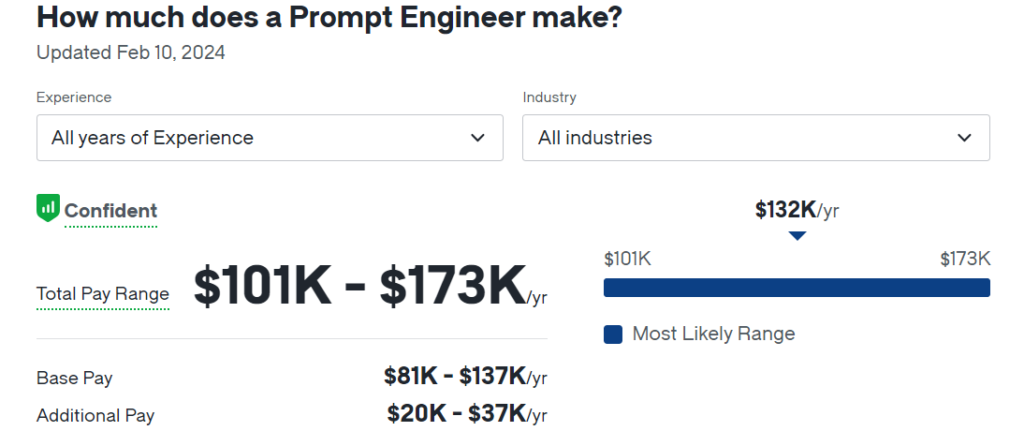Robin Li, co-founder and CEO of Baidu, made a surprising prediction that, in a decade, prompt engineering will account for half of the world’s jobs, and lacking this skill could render one obsolete. This bold statement gives us an idea of how the future job landscape is going to evolve. Even if you don’t wish to be a Prompt Engineer, you will be prompting a lot for your regular job. Learning prompt engineering will place you in an advantageous position and become essential very soon. If you wish to thrive in the rapidly changing job landscape, you should be equipping yourself with the ability to communicate with AI effectively.
What is Prompt Engineering?
Consider that you have recently acquired a very clever robot companion ready to assist you with any task, including generating images, composing poetry, and responding to inquiries. There’s a catch: this friend needs precise instructions to grasp what you mean because they interpret your words literally. That’s where prompt engineering comes into play.
Prompt engineering involves carefully creating and adjusting the input text (prompts) that guide generative AI models, such as language or image generators, to produce specific, desired outcomes. This process emphasizes selecting precise words, phrases, formatting, and sometimes examples to communicate the task at hand clearly to the AI, enabling it to understand and fulfil the request accurately.
Prompt Engineering Salaries
If you secure a prompt engineering job in 2024, you earn an average of $131,652 annually in the USA. This figure combines a typical salary of approximately $105,353 with an additional $26,299 from bonuses and other perks. However, it’s important to remember that these are average figures, and actual earnings can vary depending on location, demand and time. Entering the field of prompt engineering offers a route into a future-focused career. Still, you should remember that acquiring a proper skill set is necessary to achieve this financial reward.
In ten years, half of the world's jobs will be in prompt engineering, and those who cannot write prompts will be obsolete.
Robin Li, the CEO of Baidu Tweet
What does a prompt engineer do?
As a prompt engineer, your job will involve a mix of creative, analytical, and ethical responsibilities. Here’s what you will be doing as a prompt engineer:
- Preparing AI Prompts: You’ll create specific instructions (prompts) for AI to generate the desired outputs, whether text, images, or another form of content.
- Testing and Refining: Experiment with different prompts to see how the AI responds, analyzing the outputs to determine what works best.
- Ethical Considerations: AI can be biased, which can produce unwanted results. When preparing a prompt, you have to consider ethics, cultural sensitivities, fairness, and potential biases to ensure the responsible use of AI.
- Optimization: AI systems run on resource-hungry servers. Generating some outputs might require a lot of computing power and time. It will be your duty to create a prompt that uses optimum resources.
- Integration: You might have to embed these AI prompts into applications and software to help automate complex or repetitive tasks.
- Collaboration: Work alongside cross-functional teams to develop innovative products and solutions that incorporate AI effectively.
- Chatbot Integration: You might have to integrate AI chatbots into the team’s workflow or customer services to automate tasks and reduce human involvement.
- Performance Monitoring: You might have to monitor the AI systems’ performance and make adjustments as needed to maintain or improve output quality and efficiency.
Required Qualifications to become a Prompt Engineer:
Based on the job postings on LinkedIn, I have summarized the key qualifications. You do not need to have all these qualifications; the employer is merely seeking the best talent. Feel free to do your own research by going through recent prompt engineering jobs that are available on LinkedIn. Here is the summary:
Experience & Education:
- 2+ years in conversation design, software engineering, or computational linguistics.
- At least one year of specific experience in prompt engineering.
- A Bachelor’s degree in computer science, linguistics, computational linguistics, or a related field.
Technical Skills:
- Extensive experience with Large Language Models (LLMs) and prompt engineering.
- Strong knowledge of chatbot development or AI project involvement.
- Proficiency in programming languages like Python, C++, or equivalent, including experience with Regular Expressions for data pre/post-processing.
- Basic to intermediate understanding of Natural Language Processing (NLP) techniques and libraries.
Tools & Technologies:
- Familiarity with AI and NLP platforms such as Dialogflow, Watson, LUIS, etc.
- Proficiency in data analytics and visualization tools like PowerBI or Google Analytics.
- Experience with project management tools such as Azure Boards, Asana, or similar suites.
Soft Skills & Management:
- Experience managing high-performance teams of engineers or scientists.
- Strong communication, collaboration, and coaching abilities.
- Creativity, problem-solving attitude, and a “hacker spirit.”
- Comfortable in uncertain, ambiguous, and fast-paced environments.
Strategic Thinking & Safety Awareness:
- Ability to think holistically and proactively identify organizational needs.
- Passion for making powerful technology safe and beneficial for society.
- Creative thinking about the risks and benefits of new technologies.
These qualifications highlight the importance of a solid technical foundation, practical experience in prompt engineering and related fields, leadership and communication skills, and a forward-thinking approach to technology and its impacts.
Do you need a degree to become a Prompt Engineer?
The short answer is no, you don’t need a degree to become a prompt engineer.
However, a degree in a relevant field, such as computer science or engineering, can be advantageous, but it is not always a strict requirement. Many professionals in this field have successfully built their careers through self-study, practical experience, and continuous learning. You can overcome this issue by creating a strong portfolio and staying connected with the community. You might be asking, “If I don’t have a degree, where do I start?” Well, you will find tons of free resources at your fingertips, including YouTube, books, and websites. Plus, you can dive deeper with paid courses available on Coursera, Udemy, and LinkedIn Learning.
How to become a prompt Engineer?
Prompt engineering is a fascinating career. You get to work with AI language models, apply your writing skills, and help businesses succeed. To start your journey in this field, here’s what you need to do:
- Research Your Job Qualifications: First, initiate your job research by exploring LinkedIn or Google to discover the qualifications employers seek. Delve into at least ten job listings to gain a comprehensive understanding. Subsequently, pinpoint the qualifications consistently requested across companies. This strategy will provide you with a clear insight into the qualifications you should aim to acquire.
- Acquire Relevant Education and Credentials:
- You do not need a bachelor’s degree in computer science or a related field, but having one can be beneficial.
- Consider prompt engineering certifications and courses offered by reputable organizations or online platforms like Blockchain Council, Coursera, LinkedIn Learning, Udemy, and edX to gain recognized credentials.
- Develop Essential Skills: Technical Skills: Gain proficiency in programming languages, especially Python, and familiarize yourself with NLP and ML concepts. Tools and libraries like NumPy, Pandas, and NLTK are crucial.
- Prompt Engineering-Specific Skills: Enhance your writing skills for clarity and context in prompts. Experiment with different AI models (e.g., GPT, BERT) to understand their nuances.
- Soft Skills: Cultivate an understanding of human psychology to empathize with end-users and create more effective prompts.
- Hands-On Experience:
- Engage with AI language models through platforms offering access to models like ChatGPT, BERT, and others.
- Design projects or find applications in your current role that allow practical application of prompt engineering, such as chatbots or content generation tools.
- Learn Through Doing:
- Master the Python programming language and its application in data analysis, NLP, and machine learning.
- Dive deep into AI fundamentals, understanding the core concepts and subfields like machine learning and deep learning.
- Get hands-on with pre-trained models, fine-tuning them for custom applications, and experimenting with different prompting techniques.
- Build a Portfolio: As you accumulate experience, document your projects and achievements in a portfolio. This can be a powerful tool when applying for jobs or showcasing your skills.
- Apply for Jobs and Keep Learning:
- With skills and a portfolio in hand, start your job search.
- Tailor your resume and cover letter for prompt engineering roles. Continue learning, staying up to date with the latest advancements in AI and prompt engineering.
- Engage with the community through platforms like LinkedIn and Kaggle.
- Engage with the AI Community: Join forums, attend workshops, and follow leading voices in AI and prompt engineering. Sharing insights and challenges with peers can open new learning avenues and career opportunities.




